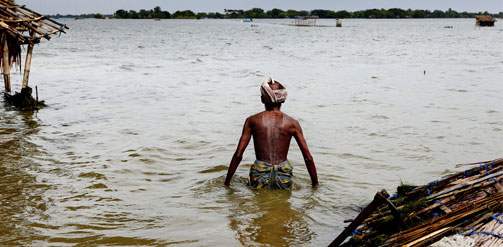I was fortunate to participate recently in the Research for Health in Humanitarian Crisis (r2hc) event in London. It brought together an impressive range of academics and INGOs doing research designed to save lives in the most challenging circumstances.

Here at IDS we know all about the benefits of r2hc research funding – it was this fund that supported the Ebola Response Anthropology Platform that back in 2015 helped to transform the humanitarian response to the spread of the deadly virus. Last week IDS along with our partners at the International Rescue Committee and Crown Agents launched the Humanitarian Learning Centre – all part of our ongoing commitment to bring together operational learning with academic insights to support people in the aftermath of disasters, emergencies and conflict.
The panel I chaired on improving humanitarian outcomes with evidence included people who were both doing research and actively trying to have a real effect on how agencies and governments respond to crisis. The recurring issue seemed to be the need to work in close partnership with governments, district level officials, humanitarian agencies and the effected communities in order for learning to be put into practice. It was also clear that it is not always about unearthing new evidence but simply brokering existing knowledge – such as in the case of the Ebola platform that made available a body of long term research.
It is clearly very challenging to overcome inertia and deal with the normal slow pace of change in governments and large institutions in the midst of a fast changing and unpredictable humanitarian environment. Donors, agencies and government fail on many occasions to invest in the new approaches that have been recommended by those conducting rigorous research. In international development evidence use behaviours and partnerships can take a long time to take effect. Just consider the success of Bangladesh’s evidence based approach to tackling extreme poverty – the result of decades of investment in research partnerships. But as the international community scramble to respond to the devastation caused by hurricane Irma and plan support of the persecuted Rohingya in Myanmar some of the crucial partnerships are more likely to be 4 weeks than 40 years old.
For some on the panel the word advocacy kept coming up. It is not a word one hears much at academic conferences and it is certainly not the term used in donors’ research uptake guidance. However there seemed to be some consensus around the idea that humanitarian learning needs to be more dynamically promoted. ‘Diffusion’ as the r2hc uptake guidance recommended seemed to suggest something rather benign and slow paced. However advocacy always raises thorny issues around research objectivity, independence and academic rigour. In my view if we want to close the gap between evidence of what works and what actually gets done we need to challenge the pernicious ideas that: a) research made accessible, understandable and communicated to key decision makers in a timely manner will automatically lead to positive change, and b) that advocacy is incompatible with high quality research.
Let’s take a) first. Evidence is one very small part of how and why change happens. It is not sufficient to prove with rigorous research that another more effective approach is possible and communicate this to key stakeholders. Political processes, political expediency, money, individual personalities, ideology and the capacity to actually understand and use evidence and make changes are all far more important than the data itself. Of course there is lots we can do to strengthen the links between research and policy. These mostly require long term investment in knowledge management systems, relationships, networks, policy engagement and the capacity of researchers, practitioners and policy actors to work better together. The ESRC DFID Impact Initiative for International Development Research have set up an online Impact Lab that provides some good tips for development researchers and donors in these areas.
Then we come to the dreaded ‘A’ word. I reject that there has to be a compromise between engagement with policy and research rigour. I’d argue that at the sharp end of the development and humanitarian sectors where lives and livelihoods are at stake one actually compliments the other. Advocacy driven networks enable dynamic timely partnerships to emerge. Research is co-designed, co-constructed and co-communicated. Advocacy processes, whether aimed at influencing your own agency or partners (a great mentor of mine and veteran NGO campaigner once said that two thirds of advocacy was always internal) or governments, pave the way for deeper engagement with communities and civil society. This was nicely demonstrated by the Hunger and Nutrition Commitment Index. The methodology was rigorous and research peer reviewed but it was developed in close partnership with NGOs and the under-nutrition movement. It was unashamedly designed as an advocacy tool. Reflecting on it we came to the conclusion that a perceived choice between supporting advocacy movements with research or producing high quality evidence is an entirely false dichotomy.
So I hope those seeking to enhance humanitarian work with knowledge and learning will embrace advocacy approaches. Perhaps it is the humanitarians and not the development wonks who will finally manage to add the discipline of ‘knowledge advocacy’ to the plethora of methodological approaches recommended in tool kits and guidelines on research uptake and evidence informed policy making.
For more on improving development and humanitarian processes with evidence download for free The Social Realities of Knowledge for Development, IDS 2017 (Georgalakis J, Ramalingam B et al)